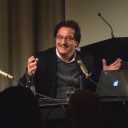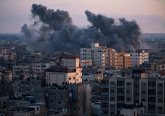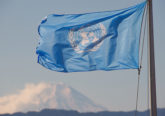 The balance sheet after three weeks of protests and police violence in Turkey is grim: four people were killed, more than 7,000 wounded, 11 lost their eyesight and several hundred detained. What began as a localised protest over a shopping centre and the demolition of the Gezi Park in Istanbul’s central Taksim Square turned into a nationwide conflagration in response to the inciting rhetoric of Prime Minister Recep Tayyip Erdoğan and the unfettered police brutality unleashed upon peaceful protestors. The image of German Green Party Chairwoman Claudia Roth, barely able to speak following a teargas attack on her hotel next to the Gezi Park, will come to haunt Turkey’s political elites for years to come.
The balance sheet after three weeks of protests and police violence in Turkey is grim: four people were killed, more than 7,000 wounded, 11 lost their eyesight and several hundred detained. What began as a localised protest over a shopping centre and the demolition of the Gezi Park in Istanbul’s central Taksim Square turned into a nationwide conflagration in response to the inciting rhetoric of Prime Minister Recep Tayyip Erdoğan and the unfettered police brutality unleashed upon peaceful protestors. The image of German Green Party Chairwoman Claudia Roth, barely able to speak following a teargas attack on her hotel next to the Gezi Park, will come to haunt Turkey’s political elites for years to come.
Since the Justice and Development Party’s (AKP) third election victory in 2011, resulting in a strong popular mandate of almost 50 per cent, Prime Minister Erdoğan has been resorting to a politics of increasingly authoritarian government. Several legal initiatives have been rushed through Parliament without due debate, ranging from the extension of religious education classes and the conversion of secular state schools into Islamic institutions, to harsh limitations on the sale and consumption of alcohol. More laws awaiting approval will open up environmental protection zones and forests to construction, further intensifying the government’s obsession to turn the country’s environmental resources and urban heritage into profitable assets. Beyond these highly debatable initiatives, the language of the Prime Minister has taken on a distinctly dictatorial quality. In speech after speech, he lectures women on how many children to bear, calls abortion a crime against humanity, declares himself as the leader of all Muslims, and even made comments about certain TV shows, which he deemed incommensurable to traditional values. This loose talk could be dismissed as populist politicking, yet it would be to underestimate the depth of the authoritarian turn. The media has come under severe censorship, with dozens of journalists in jail. Leading columnists have lost their jobs and editor-in-chiefs have received direct calls from a Prime Ministry intent on shaping their editorial policy.
It is hence not surprising that a significant portion of Turkey’s society, which also feels unrepresented by the infighting-plagued main opposition party, was ready to go to the streets, when the initial protests over the shopping centre were brutally repressed. Amid the violence, however, Gezi Park and Taksim Square emerged as a laboratory of consensual politics beyond authoritarianism and ethno-religious and cultural polarisation. During the many sit-ins, cultural events and discussions at the Park, people of very different backgrounds, who would otherwise not come into contact – Turkish secularists and nationalists, Kurdish activists, members of the creative professions and white collar workers, Socialists, religious and ethnic minorities, Islamists as well as LGBT and gender campaigners – found a way to manage coexistence and respect for pluralism. Outbursts of creativity, political wit and humour pointed to an alternative repertoire far removed from the confrontational and masculine content of Turkey’s politics: graffiti, subversive slogans, choirs, and ad-hoc concerts filled the squares. This was a very subversive and life-affirming form of protest.
The response of the Prime Minister was less than statesmanlike. Rather than addressing the grievances of the protestors, he called for a series of rallies of his party faithful, which were brought in for free by the municipality. Turkey’s EU Minister Egemen Bağış labelled the protestors as terrorists and accused the international media and the European Parliament of undue interference. He even praised the Prime Minister as the ‘world’s most charismatic leader’. The Interior Ministry is reported to hold a tender for 100,000 new gas bomb cartridges, 60 water cannons and more than 100 antiriot vehicles. Plans are being considered for a tighter screening of social media, and several protestors have been reprimanded in custody. The Ministry of Health is attempting, so far unsuccessfully, to investigate doctors and nurses who worked in makeshift clinics at the Park, which were also attacked with tear gas.
While these heavy-handed security policies do not bode well for the country’s democracy, the future may yet hold surprises. The domestication of the once all-powerful military has opened up considerable political space. Cracks in the government have become apparent after the narrowly averted resignation of the Deputy Prime Minister, and tensions between Erdoğan and President Abdullah Gül have become apparent. The mayor of Istanbul has conceded that no project should go ahead without prior public consultation. Turkey’s political class may yet find ways to reign in Erdoğan, whose political future is now far from certain. In the meantime, the protests have taken on a new direction. In 23 parks in Istanbul, and in many more over the country, nightly forums are held in which participants are exploring new forms of debate, discuss ways of collective action and seek to overcome the many fault lines, which characterise Turkey’s society. It is there that debates over citizenship and the future course of Turkey gain momentum. Acts of civil disobedience, from the ‘standing men and women’, who remain still in central squares or read books, are continuing.
Whether this new generation of politicised citizens will be able to change what has always been an overbearing state tradition is impossible to say. Yet, the June protests in Turkey have already inspired protestors in countries as diverse as Greece, Bulgaria, and Brazil. The demonstrations they engage in have different root causes, but they all call for a new form of politics beyond neoliberal restructuring, destructive environmental policies, self-interested political elites and dysfunctional democracies.






1 Comment